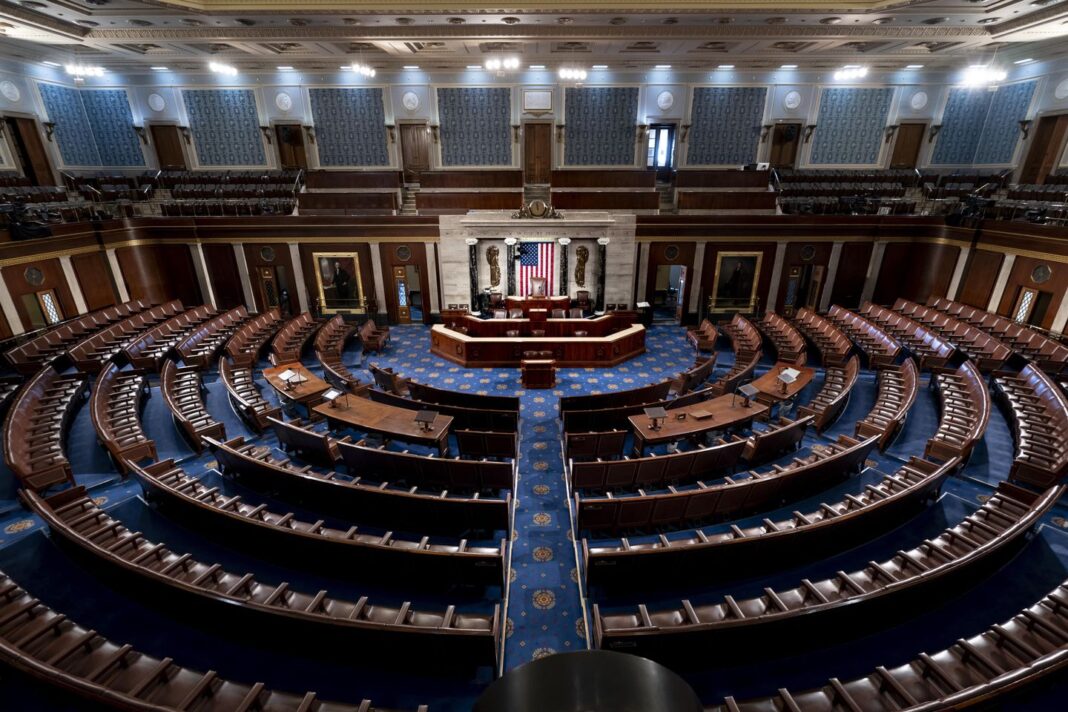The Daily Observer London Desk: Reporter- Donna Robert
The Democratic Congressional Campaign Committee announced Monday the list of 33 competitive Republican-held or open districts nationwide that it will target in its bid to recapture the House majority in 2024.
Nearly half the districts Democrats are eyeing sit in California and New York.
The remaining are one to two seats each scattered about in Arizona, Colorado, Florida, Iowa, Michigan, Montana, Nebraska, New Jersey, Oregon, Pennsylvania, Texas, Virginia and Wisconsin.
The targeted Republican lawmakers include Reps. David Valadao (CA-22), Lauren Boebert (CO-3), Maria Elvira Salazar (FL-27), Mariannette Miller-Meeks (IA-1), Ryan Zinke (MT-1), Tom Kean Jr. (NJ-7), George Santos (NY-3), Mike Lawler (NY-17), Scott Perry (PA-10), and Jen Kiggans (VA-2).
Rep. Suzan DelBene, Washington Democrat and DCCC chairperson, said that the “vulnerable Republicans on the list have worked hand in hand with Speaker [Kevin] McCarthy to enable the most dangerous wings of their party to threaten our jobs, roll back women’s freedoms, endanger Americans’ economic security, and prioritize politics over people.”
Despite the poor economy and President Biden’s weak polling numbers, House Democrats are counting on the power of White House incumbency and the chaotic political environment of a potential Donald Trump candidacy to bring out their base and persuade independents to pull their candidates across the finish line.
“The DCCC is prepared to recruit exciting and battle-ready candidates in these key districts and ensure voters see the clear contrast between Democrats’ track record of delivering for the middle class, and Republicans’ radical agenda that puts Americans’ pocketbooks, communities, and livelihoods at risk,” Ms. DelBene said.
The DCCC last month boasted about beating its GOP counterparts, raising $12.7 million in February to the National Republican Congressional Committee’s $6.6 million.
“Only two months into a Republican majority and the DCCC is shattering fundraising records and doubling the NRCC’s monthly hauls,” DCCC spokesman Tommy Garcia said.
“Voters clearly want proven leaders in Congress who are fighting to solve everyday challenges, not self-serving politicians who willingly embrace dangerous extremism and plans that threaten the safety, livelihoods, and pocketbooks of everyday families,” he said.
However, Republicans see a path forward to broaden their numbers in the House.
Many of their targets are Democrats who eked by with less than $83k in their campaign accounts – despite raising an average of over $4 million last cycle.
“Despite raising wads of campaign cash, House Democrat candidates still needed to dig in the couch cushions to fund their narrow victories last cycle,” NRCC National Press Secretary Will Reinert said in a statement. “With a target squarely on their back, these 14 Democrats’ campaign cash balances spell doom for their reelection chances in 2024.”
Republicans last month announced 37 seats currently held by vulnerable House Democrats that they see as an opportunity to maintain and expand their majority.
Those targeted Democratic lawmakers include Reps. Mary Peltola (AK at large), Mike Levin (CA-49), Jahana Hayes (CT-5), Frank Mrvan (IN-1), Dan Kildee (MI-8), Steven Horsford (NV-4), Marcy Kaptur (OH-9), Susan Wild (PA-7), Vicente Gonzalez (TX-34), and Abigail Spanberger (VA-7).
National Republican Congressional Committee Chairman Richard Hudson described Democrats’ agenda as “extreme” following Monday’s release of their targeted races.
“Republicans are in the majority and on offense. We will grow our House majority by building strong campaigns around talented recruits in these districts who can communicate the dangers of Democrats’ extreme agenda,” said National Republican Congressional Committee Chairman Richard Hudson. “These House Democrats should be shaking in their boots.”
Of the 71 closest House races, Republicans recaptured the lower chamber last cycle by a slim margin by flipping just five seats, winning nine newly drawn open districts and reelecting nine incumbents in the most competitive districts.



